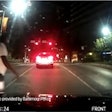 Photo courtesy of William Harvey.
Photo courtesy of William Harvey.
The court case of Brady v. Maryland (1963) requires that prosecutors disclose materially exculpatory evidence in the government's possession to the defense. This will often be referred to as "Brady material" or evidence the prosecutor is required to disclose under this rule. Any evidence favorable to the accused including attacking your credibility is fair game. So if you have been deceitful in your professional career, you and your career are fair game in the courtroom.
So have you been intentionally deceptive in your career? This can take shape in several ways. One, have you ever been intentionally deceptive in formal proceedings such as testifying in court or with internal affairs? Secondly, have you ever withheld information or were deceptive about criminality during police actions? Perhaps you didn't want to squeal, so you stood behind a code of silence?
Have you ever maliciously fabricated evidence to strengthen your case. We once called it "padding" or "flaking" when an officer added more products to push a drug arrest to felony levels. These are but the short list of sins that will get you labeled a "Brady Cop."
Giglio v. United States (1972), which states that the prosecution must provide defense with any information germane to the credibility of the prosecution's witnesses, further extends the concept. It requires the prosecution and police to make efforts to discover information that speaks to a witness's creditability. Sounds simple, right? Check into your witnesses, maybe one of them has lived a life of deceit and lies. However, this list includes you! If you have been sanctioned for deceit in an internal investigation, it will be disclosed.
If the prosecution does not disclose material exculpatory evidence under these rules, and prejudice has ensued, the evidence will be suppressed. The evidence will be suppressed regardless of whether the prosecutor knew the evidence was in his or her possession, or whether or not the prosecutor intentionally or inadvertently withheld the evidence from the defense.
The defendant bears the burden of proving that the undisclosed evidence was material, and the defendant must show that there is a reasonable probability that there would be a difference in the outcome of the trial had the evidence been disclosed by the prosecutor.
Intentional, malicious, or deceptive conduct will permanently destroy an officer's credibility. Should an officer violate these standards, there is no alternative in an employment context other than termination or permanent removal from any possible activity where the officer could be called upon to be a witness to any action. Yes, it can be that serious.
The shine of your shield or polish of your shoes won't save you. The jury only wants to hear the truth. It's expected that police officers embrace the truth and that's the pivot that the scales of justice balance on. Years ago, I was updating a lesson plan on courtroom testimony. An astute judge once told me that without your truth and veracity you are nothing in his courtroom. He said, "Cherish it and guard it with your life." This advice is priceless.


















